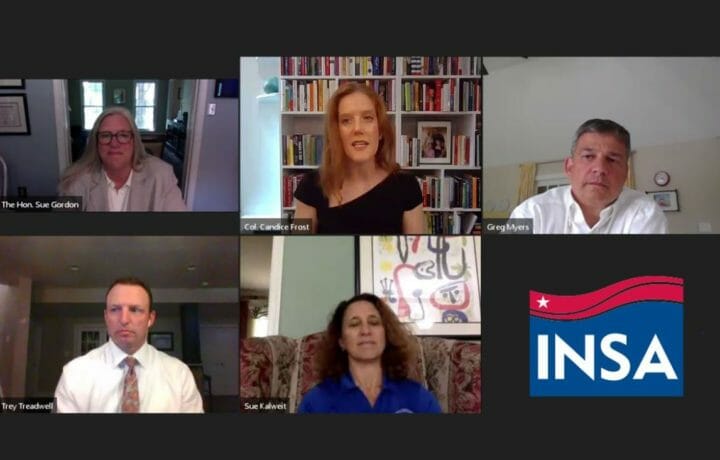Yesterday’s ‘Women as Mentors’ panel, hosted by the Intelligence and National Security Alliance (INSA) was made up of Intelligence Community rock stars who have cultivated mentoring relationships throughout their careers and have insights to offer women in the national security industry.
Moderator Sue Gordon, former principal deputy director of national intelligence, kicked off the discussion as the panelists worked through audience questions over the course of the hour. A few key themes continually resurfaced, including diversity of perspectives.
The panelists offered advice on how to build and strengthen all kinds of mentoring relationships. When asked how they would describe mentorship, these are some of the buzzwords that they threw out: trusting, growth, authentic, investment, service, support, and commitment.
THE MENTORING SUBJECT MATTER EXPERTS
Susan Kalweit: NGA – Value of Lessons Learned and Personal Experience
Susan Kalweit, the director of the Analysis Directorate at the National Geospatial-Intelligence Agency, offered direction on sharing experiences and connections with other people in your network. She emphasized how important sharing lessons learned really is. “Everyone brings something unique to mentorship,” she noted. Finding female mentors can also work positively for women in the IC, as some professionals may be more comfortable with an understanding mentoring relationship that another woman can relate to. She also responded to questions from the audience about her personal experience being a ‘coach,’ which she described as someone who is responsible for helping their ‘client’ find the answers from within.
Greg Myers: Microsoft – Care and Commitment From Mentors is Essential
Greg Myers, vice president of U.S. Federal Government at Microsoft, reminded viewers that it’s important to actively seek out diverse opinions from your mentors. Avoiding generalization is key since the pandemic has created pressures on different types of people. “Real interest in the full human being and what they are going though and the situation we are going through now – it’s even more important to reinvest in people and let them know they are important,” he said. He also confessed that he thought he wanted honest feedback from one of his past mentors, he came to the realization that he just wanted a pat on the back. What that mentor brought was care and commitment, which are two very essential traits.
Trey Treadwell: ODNI – Mentors Are at Every Level
Assistant Director of National Intelligence and IC CFO, Trey Treadwell noted mentoring relationships don’t always have to come from senior leadership. It’s important to seek out mentors from all levels, build a shared trust, and learn from a diversity of opinions.
Col. Candice Frost: Army – Mentor to Open up the Conversations
Last but certainly not least, Col. Candice Frost, director, Foreign Intelligence, Army G-2, (and ClearanceJobs contributor) urged the mentors in ‘The New IC’ audience to encourage their mentees to speak up to their supervisors and communicate about their situations as parents, employees, and now possibly even teachers in a post-COVID world. “We want to keep great women in the IC,” she said, “so we need to mentor them now to open up that conversation.”
ADVICE TO NATIONAL SECURITY WORKERS
If you’re stuck on a problem, use your mentor, and don’t try to do too much on your own. Learn to delegate and lean on your colleagues.
Col. Frost, being a lover of surfing, offered a metaphor on how you’re going to fall off the board sometimes. “You can have it all, but you can’t have it all the time,” she said. “You can’t be 100% the best mother or 100% the best officer. Some days you’ll be 99% mom, and 1% officer. Other days you’ll be 100% intelligence and have to delegate the rest.”
Welcome uncertainty, even accept it, and be bold in your cleared career.




